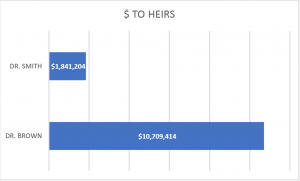
Dr. Smith and Dr. Brown are both 50-year-old physicians, who each earn $750,000 a year and have no debts. They are married with children and own their homes, which are each worth $2.5M. They have $500,000 in RSPs and $1,200,000 in corporate investments where they save $250,000 per year. Both have plans to retire at age 70.
The only difference is how and where they invest their corporate funds.
Dr. Smith earns an average rate of return of 5% in a diversified portfolio. He’s not a fan of life insurance since his investment advisor told him he has more than enough in assets should he predecease his spouse.
- At age 70, assuming a 5% pre-tax rate of return, Smith has $8.7M in corporate investments and $2.5M in his RSP account.
Dr. Brown, also earns a 5% pre-tax rate of return in the same portfolio. He recognizes that income from corporate investments is taxed at 50.17% and investment income reduces his small business deduction. Looking ahead, he projects that he will have more than enough investments to retire on, so the “extra” money in his investments will either end up with Revenue Canada, with his children or with a charity. He invests $150,000 per year into his corporate investments and $100,000 into a participating whole life insurance policy.
- At age 70, Dr. Brown has $6.0M in corporate funds, $2.5M in his RSP. His life insurance has cash value of $4.8M and death benefit of $8.1M.
If both have enough for a retirement income of $500,000; Who is better off?

Upon death, a taxpayer is deemed to have disposed of all capital property for proceeds equal to their fair market value. The resulting capital gain is taxed. The deemed disposition rules treat capital property owned by the deceased as if it was sold immediately prior to death. The Income Tax Act contains provisions to defer the tax owing assets are left to a surviving spouse. In this case, the Physicians and their spouse pass away at the same time. All else being equal, the difference is how assets are taxed.
Both Dr. Brown and Dr. Smith’s primary assets are the investments in their medicine professional corporations. The fact is there are up to 3 levels of tax that may occur when the corporate assets are distributed.
- Personal capital gain on the disposition of shares of the corporation.
The corporation was setup with a value of $1. The deemed value of the corporation’s shares at the time of death is the fair market value of the corporate investments which will be taxed as a capital gain as the shares are deemed to have been disposed.
- Corporate tax on the sale of corporate investments.
In order for the beneficiaries to receive their portion of the corporation’s investments, these investments have to be sold. This disposition results in a taxable capital gain. This disposition also generates a refundable dividend tax on hand (RDTOH) and a capital dividend.
- Dividend tax on distribution of assets out of the corporation.
When their investments are sold and cash is distributed to their heirs, this distribution is a taxable dividend at the heirs’ personal tax rate.
THE RESULTS?
Dr. Smith was solely focused on asset accumulation, and because he had no life insurance, 71% of his assets were lost to tax. Because of the preferred tax treatment of life insurance, Dr. Brown’s estate only paid 29% tax. The impact to their children was significant.
Once Dr. Brown realized he had enough to retire with; he pivoted from accumulating assets to minimizing tax.
What have you done?
The amount of tax payable will ultimately depend on the type of post-mortem planning that is done and whether or not there are planning tools available at the time you and your spouse pass away. Loss carry back planning, pipeline planning, a transfer of shares and liquidation of assets or a combination of these strategies may be useful if they are available at the time you and your spouse pass away.
One tool that is locked in, guaranteed, not subject to tax and flows through your corporation tax-free is permanent life insurance. The effect on your estate is significant.
Elliott Levine is the President of Levine Financial Group in Toronto
We Save Physicians Money on their Insurance
416-222-1311 I info@levinefinancialgroup.com
This article is for discussion purposes only.

